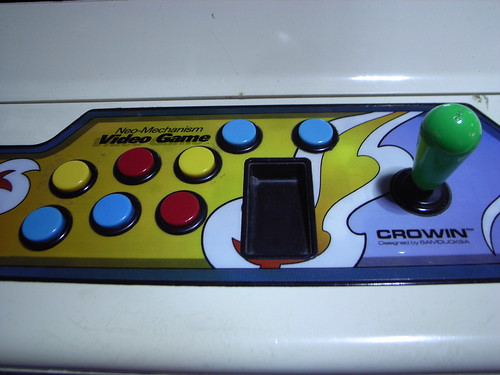 In "The Evolution of Game Controllers and Control Schemes and their Effect on their games", Alastair H. Cummings interestingly traces the history of video-game controllers. A good read in conjunction with my earlier post about this very topic. What is relevant in that paper is the second part of the issue: how the evolutions of game controller schemes is reflected in the game play, what is the mutual relationship between both. See for example:
In "The Evolution of Game Controllers and Control Schemes and their Effect on their games", Alastair H. Cummings interestingly traces the history of video-game controllers. A good read in conjunction with my earlier post about this very topic. What is relevant in that paper is the second part of the issue: how the evolutions of game controller schemes is reflected in the game play, what is the mutual relationship between both. See for example:
"The first controllers were made of whatever was available to the scientists in their electronics labs and the games were equally simple. Highly simplified versions of sporting activities such as table tennis, shooting galleries and space shooters. With the creation of the gamepad games became more complicated. Games didn’t have to be simple concepts, although the gameplay was still limited by the computing power of the era. 2D platform games took players on long journeys with them in control of simple movement of their characters. With 3D came the analogue stick, providing players with a way to guide their characters around their new 3D environment. The latest consoles let players perform the actions that they want their characters to perform and they can become part of the game more than ever before. (...) Finally there is the purely functional purpose of the PC control schemes. Whilst reflecting little on the actual actions taken in the game, the simple control schemes can become second nature to players, to give them a feeling of immersion on par with the best novelty controller. Despite this it can be seen that there has been minimal development on new types of games on the PC, these control schemes work, and so these games are the only ones that will be played."
Why do I blog this? interesting material for current project about tangible interfaces. There would be something to write about the evolution of game controllers, which were the forces that shaped them and how it influenced the whole game design. This paper only begin to deal this issue and I'd find intriguing to know how the schemes had been chosen and discussed by a broad range of actors (developers, game designers, etc.) in the design process per se. From my experience, I realized how much power developers in game studio had on the Wii controllers scheme decision, simply because some game designers were not really able to understand how the device worked. Things used to be different with old-school pads.